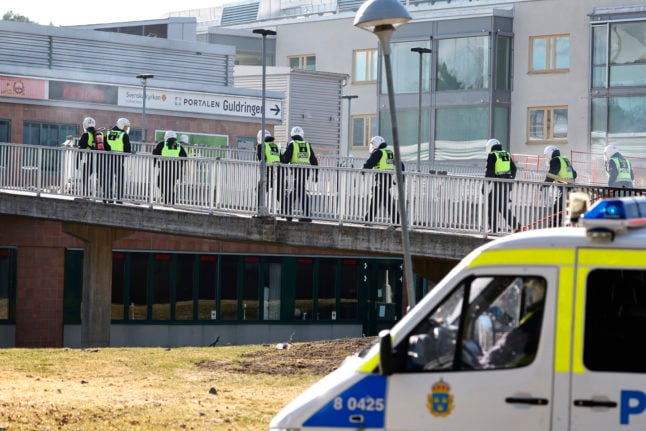The foreign ministry in Paris said three French staff were wounded in the embassy attack which forced guards to fire three warning shots, while a US official said “no staff were injured.”
As Syrian security forces looked on, Assad supporters smashed their way into the French embassy compound with a battering ram, broke windows and destroyed the ambassador’s car, according to a spokesman in Paris.
Several windows in the French mission were broken and Syrian flags were raised, one of them smashed through the wind shield of a car belonging to an embassy staffer along with a portrait of Assad.
A crowd of people were also seen attacking the nearby US embassy, several of them scaling the complex’s high outer wall and others draping a large Syrian flag over the main entrance.
“Today there was an attack by a mob on the US embassy,” a US embassy official told AFP, adding “no staff were injured” but that the attackers had caused damage.
The chancery was not breached but some of the crowd of about 300 climbed up on the roof and reached the ambassador’s residence before being chased away by US Marines, US officials said.
Windows were broken, cameras smashed, and walls spray-painted, they said.
Washington summoned Syria’s charge d’affaires, accusing Damascus of an “outrageous” failure to meet its international obligations to protect foreign embassies.
US State Department spokeswoman Victoria Nuland said Mounir Koudmani was being summoned in place of ambassador Imad Moustapha who was on holiday.
It would be made “clear that we consider that the Syrian government has not lived up to its obligations under the Vienna Convention to protect diplomatic facilities. And it’s absolutely outrageous,” Nuland said.
She defended Ambassador Robert Ford’s visit last Thursday to Hama, saying “we categorically reject” accusations from Assad’s regime that it was designed to instigate disturbances.
Ford complained to Syrian Foreign Minister Walid Muallem on Sunday about the lack of protection at the US embassy after a first round of food-throwing and rowdy protests Friday-Saturday.
Monday’s embassy attacks come four days after Ford and his French counterpart Eric Chevallier visited the central city of Hama, 210 kilometres (130 miles) north of Damascus, sparking outrage in the capital.
Their visits took place amid fears of a bloody crackdown after Friday prayers the next day by Assad’s forces, with tanks encircling the city.
“We were subjected to an attack lasting three and a half hours, by people who had nothing to do with the demonstrators but seemed well prepared and who rammed the embassy and the residence,” Chevallier said on Monday.
The assailants threw stones, “breaking almost all the embassy windows,” and tried to get inside, he told the France 2 channel in Paris by telephone.
Ford, in a US embassy Facebook post dated Sunday morning and referring to a protest outside the embassy on Saturday, said demonstrators “resorted to violence, unlike the people in Hama, who have stayed peaceful.”
“And how ironic that the Syrian government lets an anti-US demonstration proceed freely while their security thugs beat down olive branch-carrying peaceful protesters elsewhere,” he wrote.
France on Sunday summoned Syria’s envoy to Paris Lamia Shakkour over damage to the French embassy and a consulate in Aleppo on Saturday after Chevallier’s trip to Hama.
Foreign Minister Alain Juppe’s cabinet chief called her in to receive a “vigorous protest”, ministry spokesman Bernard Valero said.
Human rights groups say that since the anti-regime protests broke out in mid-March, Syrian security forces have killed more than 1,300 civilians and made at least 12,000 arrests.
Protests were also staged overnight in several towns against Sunday’s opening of a “national dialogue” hailed by the regime but boycotted by the opposition, rights activists said.
Some 5,000 people demonstrated in Deir Ezzor in the east, the London-based Syrian Observatory for Human Rights reported, adding there were also protests in three Damascus districts.
The army was also reported to be conducting a search and sweep operation in the Jebel al-Zawiya area of Idlib province in the northwest.
People were detained in Hama and in the coastal city of Banias.
Sunday’s inaugural “national dialogue” session saw some 200 delegates take part, including independent MPs and members of the Baath party, in power since
1963.
Opposition figures boycotted the gathering in protest at the ongoing deadly crackdown on anti-regime protests.
Meanwhile, the number of Syrian refugees in Turkey fell to about 8,500 as hundreds decided to return home over the weekend, Turkish officials in Ankara said on Monday.
The number of refugees fleeing the government crackdown and entering Turkey peaked at 11,739 at the end of June.


 Please whitelist us to continue reading.
Please whitelist us to continue reading.
Member comments